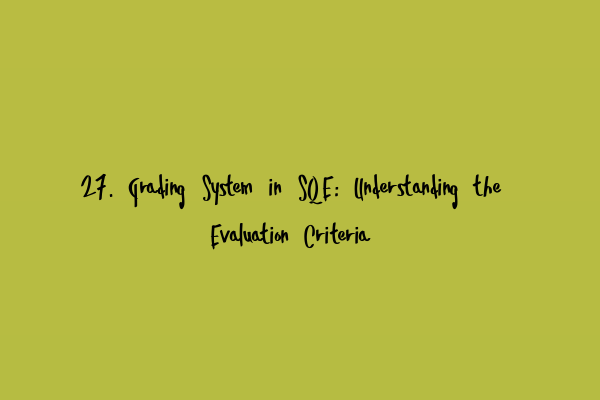27. Grading System in SQE: Understanding the Evaluation Criteria
Welcome to our blog, where we provide comprehensive information and insights into the Solicitors Qualifying Examination (SQE). In this post, we will discuss the grading system in the SQE and help you understand the evaluation criteria used in this important assessment.
The SQE is a two-part examination that aims to assess the competence of aspiring solicitors. It tests candidates’ practical skills and legal knowledge necessary to practice law in England and Wales. To ensure fairness and consistency in grading, the SQE follows a well-defined evaluation process.
Let’s dive into the details of how the SQE grading system works and what criteria are used to evaluate candidates’ performance.
1. Understanding the Grading System:
The SQE introduces a new grading system that differs from the traditional approach of using percentage scores. Instead, it follows a competency-based assessment model that measures candidates’ ability to apply legal knowledge and skills in practical scenarios.
2. Competency Standards:
The evaluation criteria for the SQE are based on the Solicitors Regulation Authority’s (SRA) Competence Statement, which outlines the standards expected from a solicitor. The SQE assesses candidates against these competency standards to ensure they possess the necessary skills and knowledge.
3. Performance Statement and Threshold:
To pass the SQE, candidates must meet the minimum performance standard or threshold set by the SRA. The performance statement defines the level of competence required for each assessment, and candidates must demonstrate that they meet or exceed this threshold to pass.
4. Objective Structured Clinical Examination (OSCE):
The OSCE is one of the assessments used in the SQE to evaluate candidates’ professional skills and abilities. It consists of various stations where candidates are tested on their legal skills, client interviewing, advocacy, and case analysis. Each station is graded independently based on predefined criteria.
5. Multiple Choice Questions (MCQs):
Another component of the SQE is the multiple-choice questions (MCQs), which test candidates’ knowledge and application of legal principles. Candidates must select the correct response from a list of options. The MCQs are computer-based and graded automatically.
6. Assessment Criteria:
For both the OSCE and MCQs, the assessment criteria include factors such as accuracy, clarity, relevance, and completeness of responses. These criteria ensure that candidates are assessed on their understanding of legal principles, ability to apply them to practical scenarios, and communication skills.
7. Pass, Competent, Fail Grades:
Based on the evaluation criteria, candidates are assigned one of three possible grades: pass, competent, or fail. The pass grade indicates that the candidate has met or exceeded the minimum performance standard. The competent grade is given when a candidate falls short of the pass grade but demonstrates a satisfactory level of competence. A fail grade indicates that the candidate did not meet the minimum requirements for competence.
8. Retaking Assessments:
Candidates who receive a competent or fail grade have the opportunity to retake specific assessments to improve their overall performance. The retake process allows candidates to focus on areas where they may have struggled initially and gives them a chance to meet the required standards.
Understanding the grading system and evaluation criteria in the SQE is crucial for candidates preparing for the examination. It helps candidates identify the areas they need to focus on and provides clarity on the standards expected from aspiring solicitors.
If you’re preparing for the SQE, our SQE 1 and SQE 2 preparation courses can provide you with the necessary knowledge and skills to excel in the examination. Additionally, our practice exam questions and practice mocks FLK1 FLK2 allow you to test your understanding and gauge your readiness for the assessment.
Remember to stay updated with the SRA SQE exam dates to plan your preparation effectively and ensure you meet the application deadlines.
Good luck with your SQE journey – we’re here to support you every step of the way!
Related Articles:
– SQE 1 Practice Exam Questions
– SQE 1 Practice Mocks FLK1 FLK2
– SQE 2 Preparation Courses
– SQE 1 Preparation Courses
– SRA SQE Exam Dates
Thank you for reading and stay tuned for more informative articles on the SQE exam and legal profession!
